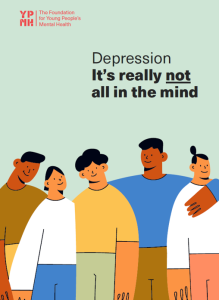 Depression – It’s really not all in the mind brings together the research and innovation that YPMH has conducted since 2019. It is presented in a form that we hope will be helpful to young adults, parents and non-medical people across organisations such as educational institutions, employers and charities that work with young people.
Depression – It’s really not all in the mind brings together the research and innovation that YPMH has conducted since 2019. It is presented in a form that we hope will be helpful to young adults, parents and non-medical people across organisations such as educational institutions, employers and charities that work with young people.
Our aim is to build understanding of why and how depression develops in children and young people of up to about 25 years of age, and to offer approaches that help individuals, families and organisations to explore how they can help prevent and reduce the severity of depression in young people.
Depression – It’s really not all in the mind:
- Summarises the factors and mechanisms that can lead to depression, such as societal and social factors; individual options and choices, experiences and underlying conditions, and psychological characteristics; and the influence of these factors on biological systems associated with depression.
- Explores the effects of everyday things, such as the food we eat and chronic stress, on the biological mechanisms that can lead to depression – and what we can do to reduce risks.
- Describes approaches to help individuals, parents and carers to make effective change.
- Outlines methods to facilitate change in organisations and in government policy
University of Cambridge Professor of Psychiatry, Peter B Jones, said ‘Depression – It’s really not all in the mind’ brings together current insights from social, psychological and biological research in a clear and accessible way.
‘The more we learn about depression, the more we must open our minds to realising that it is a whole-person issue. Depression involves the world we experience through our multiple senses, our aspirations, our individual psychology, the food we eat and how it affects the millions of bacteria that help us to digest it, and the changes to our biology that arise from these many influences. While challenging, this richer understanding of minds, bodies and the world opens new avenues for thinking about and addressing depression, including ways to prevent and treat it.’
We hope that you will find this publication useful. To explore opportunities for collaborating with us to apply the approaches described in the publication, please contact Peter Templeton, peter.templeton@ypmh.org
